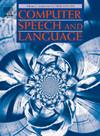Causal analysis of ASR errors for children: Quantifying the impact of physiological, cognitive, and extrinsic factors
IF 3.4
3区 计算机科学
Q2 COMPUTER SCIENCE, ARTIFICIAL INTELLIGENCE
引用次数: 0
Abstract
The increasing use of children’s automatic speech recognition (ASR) systems has spurred research efforts to improve the accuracy of models designed for children’s speech in recent years. The current approach utilizes either open-source speech foundation models (SFMs) directly or fine-tuning them with children’s speech data. These SFMs, whether open-source or fine-tuned for children, often exhibit higher word error rates (WERs) compared to adult speech. However, there is a lack of systemic analysis of the cause of this degraded performance of SFMs. Understanding and addressing the reasons behind this performance disparity is crucial for improving the accuracy of SFMs for children’s speech. Our study addresses this gap by investigating the causes of accuracy degradation and the primary contributors to WER in children’s speech. In the first part of the study, we conduct a comprehensive benchmarking study on two self-supervised SFMs (Wav2Vec2.0 and Hubert) and two weakly supervised SFMs (Whisper and Massively Multilingual Speech (MMS)) across various age groups on two children speech corpora, establishing the raw data for the causal inference analysis in the second part. In the second part of the study, we analyze the impact of physiological factors (age, gender), cognitive factors (pronunciation ability), and external factors (vocabulary difficulty, background noise, and word count) on SFM accuracy in children’s speech using causal inference. The results indicate that physiology (age) and particular external factor (number of words in audio) have the highest impact on accuracy, followed by background noise and pronunciation ability. Fine-tuning SFMs on children’s speech reduces sensitivity to physiological and cognitive factors, while sensitivity to the number of words in audio persists.
儿童ASR错误的原因分析:量化生理、认知和外在因素的影响
近年来,儿童自动语音识别(ASR)系统的使用越来越多,促使研究人员努力提高为儿童语音设计的模型的准确性。目前的方法要么直接利用开源语音基础模型(SFMs),要么利用儿童语音数据对其进行微调。这些SFMs,无论是开源的还是针对儿童的微调的,与成人语言相比,往往表现出更高的单词错误率(wer)。然而,对于SFMs性能下降的原因缺乏系统的分析。理解和解决这种表现差异背后的原因对于提高儿童言语SFMs的准确性至关重要。我们的研究通过调查准确性下降的原因和儿童言语中WER的主要贡献者来解决这一差距。在研究的第一部分中,我们在两个儿童语音语料库上对两个不同年龄段的自监督SFMs (Wav2Vec2.0和Hubert)和两个弱监督SFMs (Whisper和massive Multilingual Speech (MMS))进行了全面的基准测试研究,为第二部分的因果推理分析建立了原始数据。在研究的第二部分,我们使用因果推理分析了生理因素(年龄、性别)、认知因素(发音能力)和外部因素(词汇难度、背景噪音和字数)对儿童言语中SFM准确性的影响。结果表明,生理(年龄)和特定外部因素(音频中的单词数)对准确性的影响最大,其次是背景噪声和发音能力。对儿童言语的微调SFMs降低了对生理和认知因素的敏感性,而对音频中单词数量的敏感性仍然存在。
本文章由计算机程序翻译,如有差异,请以英文原文为准。
求助全文
约1分钟内获得全文
求助全文
来源期刊

Computer Speech and Language
工程技术-计算机:人工智能
CiteScore
11.30
自引率
4.70%
发文量
80
审稿时长
22.9 weeks
期刊介绍:
Computer Speech & Language publishes reports of original research related to the recognition, understanding, production, coding and mining of speech and language.
The speech and language sciences have a long history, but it is only relatively recently that large-scale implementation of and experimentation with complex models of speech and language processing has become feasible. Such research is often carried out somewhat separately by practitioners of artificial intelligence, computer science, electronic engineering, information retrieval, linguistics, phonetics, or psychology.
 求助内容:
求助内容: 应助结果提醒方式:
应助结果提醒方式:


